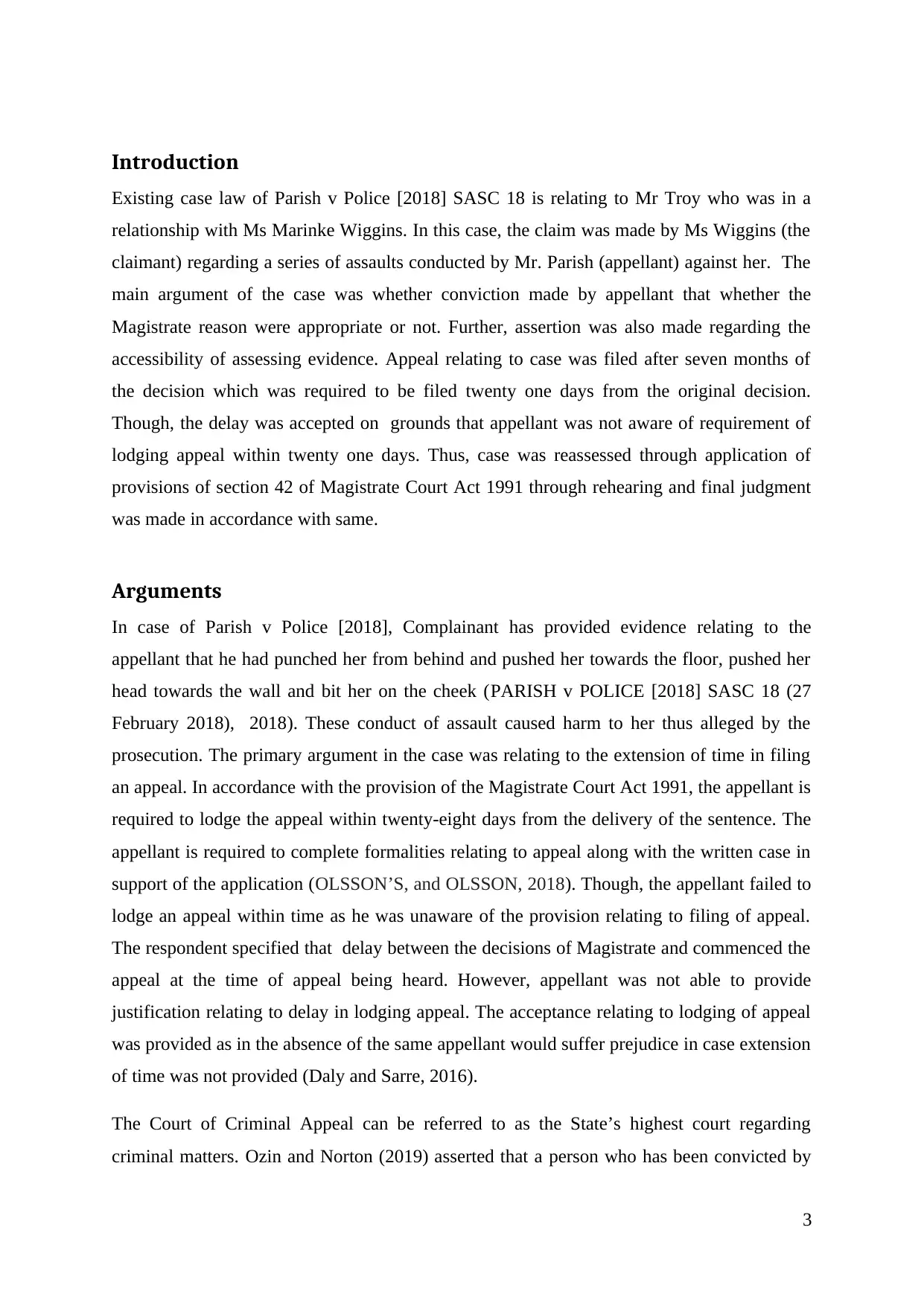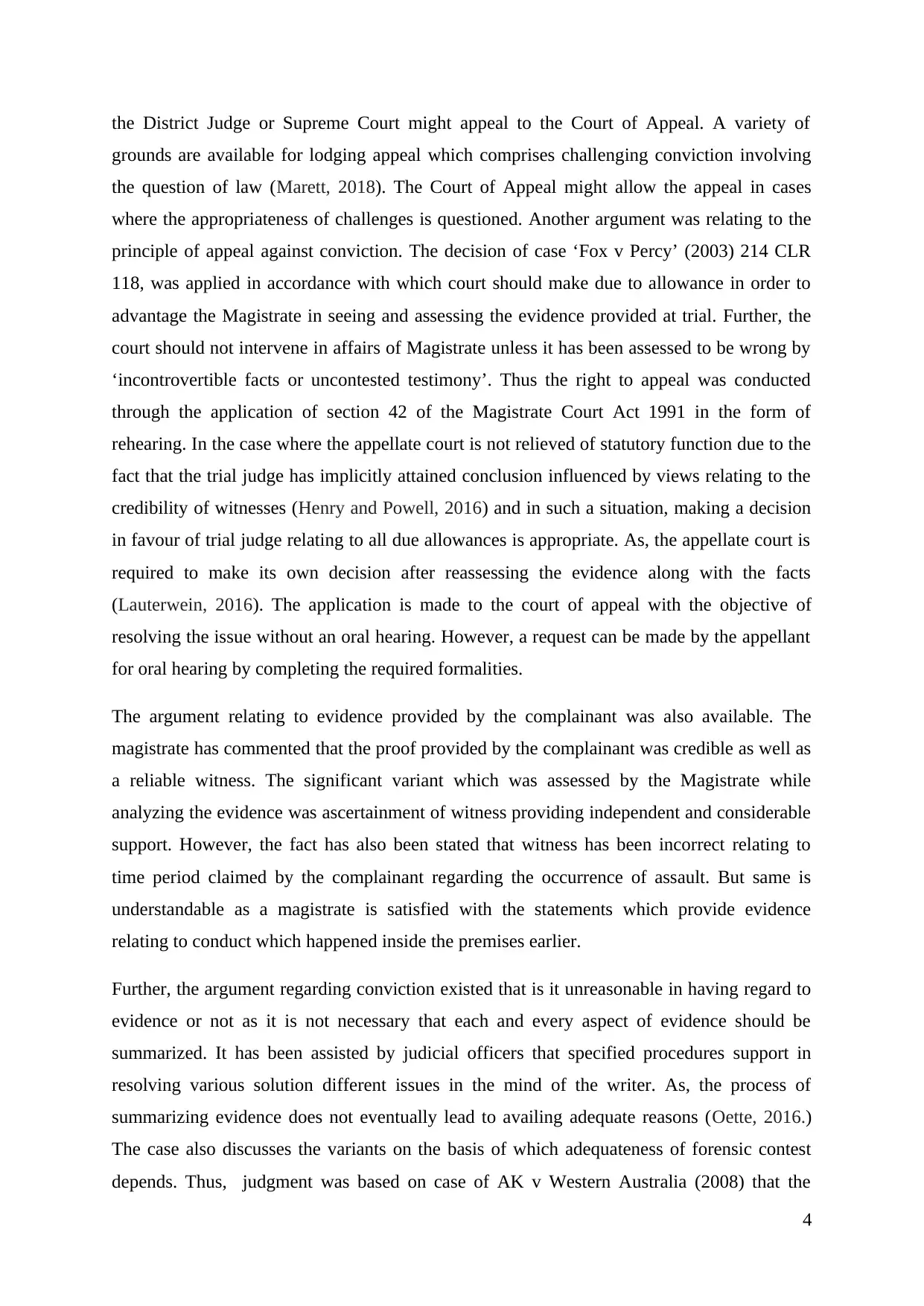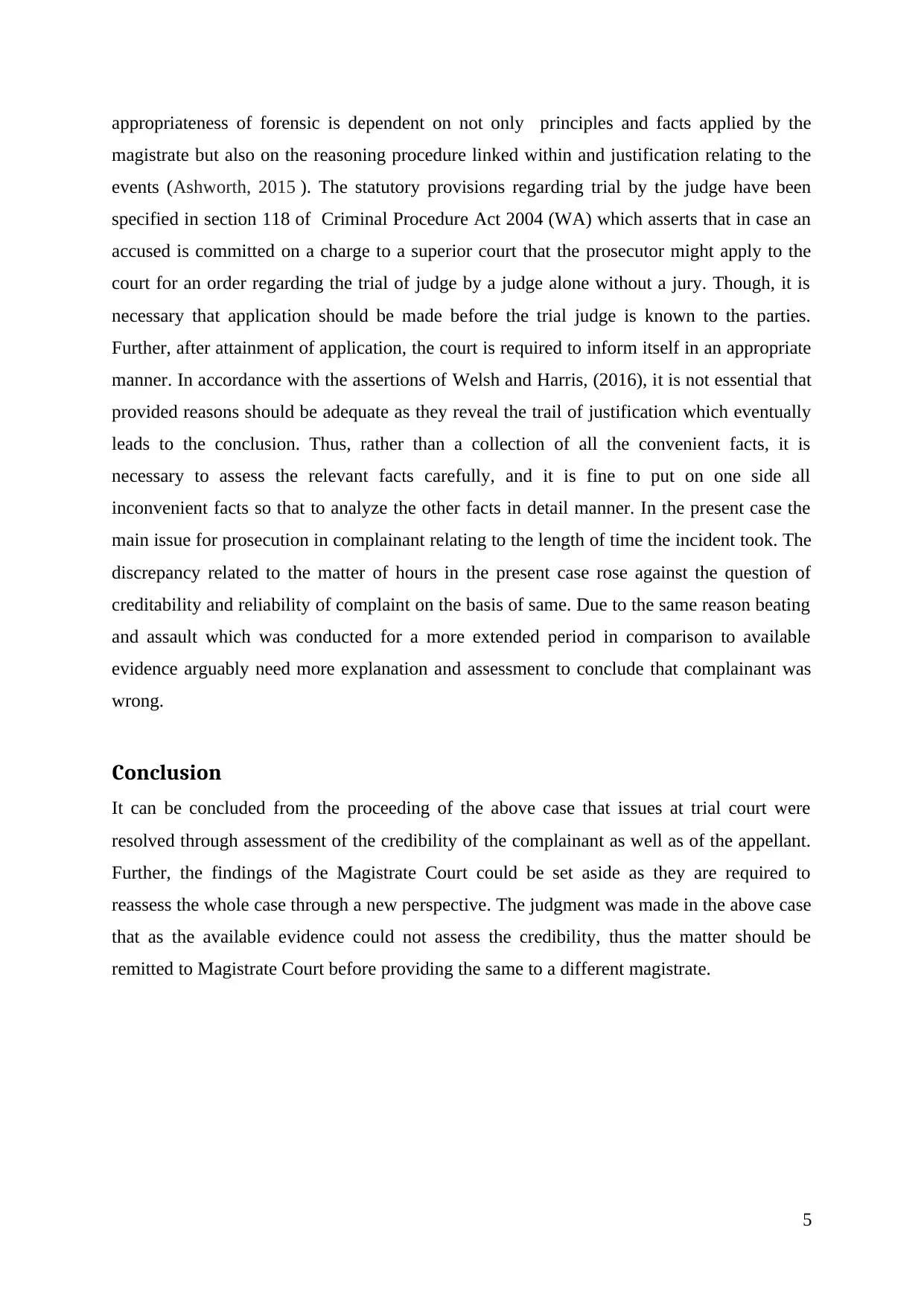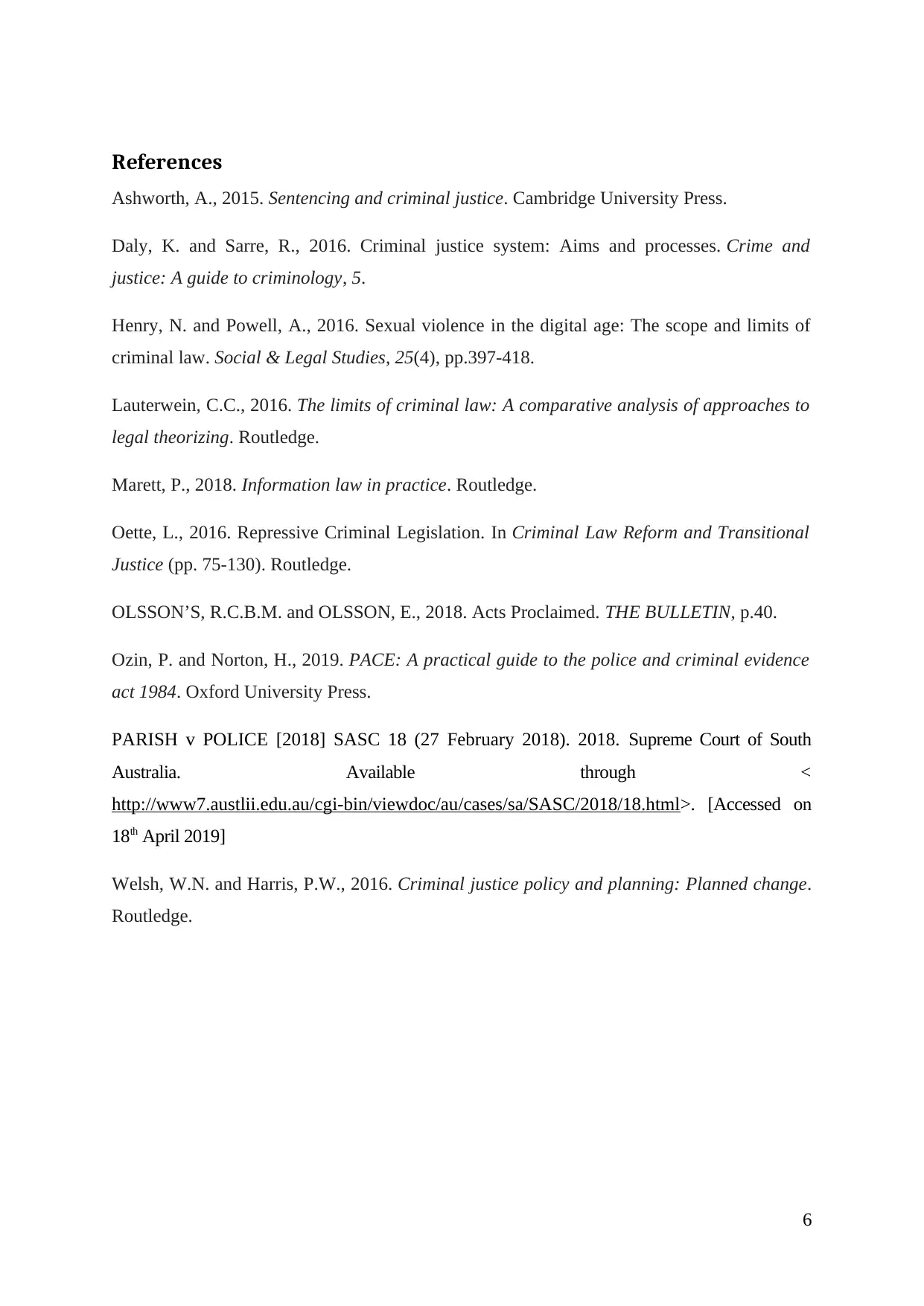Criminal Law: Case Note
VerifiedAdded on 2023/01/17
|6
|1651
|78
AI Summary
This case note discusses the conviction of Mr. Parish for a series of assaults against Ms. Wiggins in the case of Parish v Police [2018] SASC 18. It explores the arguments made in the case, including the extension of time for filing an appeal and the assessment of evidence. The conclusion of the case is also discussed, highlighting the remittance of the matter to the Magistrate Court for reassessment.
Contribute Materials
Your contribution can guide someone’s learning journey. Share your
documents today.

Criminal Law: Case Note
1
1
Secure Best Marks with AI Grader
Need help grading? Try our AI Grader for instant feedback on your assignments.

Table of Contents
Introduction................................................................................................................................3
Arguments..................................................................................................................................3
Conclusion..................................................................................................................................5
References..................................................................................................................................6
2
Introduction................................................................................................................................3
Arguments..................................................................................................................................3
Conclusion..................................................................................................................................5
References..................................................................................................................................6
2

Introduction
Existing case law of Parish v Police [2018] SASC 18 is relating to Mr Troy who was in a
relationship with Ms Marinke Wiggins. In this case, the claim was made by Ms Wiggins (the
claimant) regarding a series of assaults conducted by Mr. Parish (appellant) against her. The
main argument of the case was whether conviction made by appellant that whether the
Magistrate reason were appropriate or not. Further, assertion was also made regarding the
accessibility of assessing evidence. Appeal relating to case was filed after seven months of
the decision which was required to be filed twenty one days from the original decision.
Though, the delay was accepted on grounds that appellant was not aware of requirement of
lodging appeal within twenty one days. Thus, case was reassessed through application of
provisions of section 42 of Magistrate Court Act 1991 through rehearing and final judgment
was made in accordance with same.
Arguments
In case of Parish v Police [2018], Complainant has provided evidence relating to the
appellant that he had punched her from behind and pushed her towards the floor, pushed her
head towards the wall and bit her on the cheek (PARISH v POLICE [2018] SASC 18 (27
February 2018), 2018). These conduct of assault caused harm to her thus alleged by the
prosecution. The primary argument in the case was relating to the extension of time in filing
an appeal. In accordance with the provision of the Magistrate Court Act 1991, the appellant is
required to lodge the appeal within twenty-eight days from the delivery of the sentence. The
appellant is required to complete formalities relating to appeal along with the written case in
support of the application (OLSSON’S, and OLSSON, 2018). Though, the appellant failed to
lodge an appeal within time as he was unaware of the provision relating to filing of appeal.
The respondent specified that delay between the decisions of Magistrate and commenced the
appeal at the time of appeal being heard. However, appellant was not able to provide
justification relating to delay in lodging appeal. The acceptance relating to lodging of appeal
was provided as in the absence of the same appellant would suffer prejudice in case extension
of time was not provided (Daly and Sarre, 2016).
The Court of Criminal Appeal can be referred to as the State’s highest court regarding
criminal matters. Ozin and Norton (2019) asserted that a person who has been convicted by
3
Existing case law of Parish v Police [2018] SASC 18 is relating to Mr Troy who was in a
relationship with Ms Marinke Wiggins. In this case, the claim was made by Ms Wiggins (the
claimant) regarding a series of assaults conducted by Mr. Parish (appellant) against her. The
main argument of the case was whether conviction made by appellant that whether the
Magistrate reason were appropriate or not. Further, assertion was also made regarding the
accessibility of assessing evidence. Appeal relating to case was filed after seven months of
the decision which was required to be filed twenty one days from the original decision.
Though, the delay was accepted on grounds that appellant was not aware of requirement of
lodging appeal within twenty one days. Thus, case was reassessed through application of
provisions of section 42 of Magistrate Court Act 1991 through rehearing and final judgment
was made in accordance with same.
Arguments
In case of Parish v Police [2018], Complainant has provided evidence relating to the
appellant that he had punched her from behind and pushed her towards the floor, pushed her
head towards the wall and bit her on the cheek (PARISH v POLICE [2018] SASC 18 (27
February 2018), 2018). These conduct of assault caused harm to her thus alleged by the
prosecution. The primary argument in the case was relating to the extension of time in filing
an appeal. In accordance with the provision of the Magistrate Court Act 1991, the appellant is
required to lodge the appeal within twenty-eight days from the delivery of the sentence. The
appellant is required to complete formalities relating to appeal along with the written case in
support of the application (OLSSON’S, and OLSSON, 2018). Though, the appellant failed to
lodge an appeal within time as he was unaware of the provision relating to filing of appeal.
The respondent specified that delay between the decisions of Magistrate and commenced the
appeal at the time of appeal being heard. However, appellant was not able to provide
justification relating to delay in lodging appeal. The acceptance relating to lodging of appeal
was provided as in the absence of the same appellant would suffer prejudice in case extension
of time was not provided (Daly and Sarre, 2016).
The Court of Criminal Appeal can be referred to as the State’s highest court regarding
criminal matters. Ozin and Norton (2019) asserted that a person who has been convicted by
3

the District Judge or Supreme Court might appeal to the Court of Appeal. A variety of
grounds are available for lodging appeal which comprises challenging conviction involving
the question of law (Marett, 2018). The Court of Appeal might allow the appeal in cases
where the appropriateness of challenges is questioned. Another argument was relating to the
principle of appeal against conviction. The decision of case ‘Fox v Percy’ (2003) 214 CLR
118, was applied in accordance with which court should make due to allowance in order to
advantage the Magistrate in seeing and assessing the evidence provided at trial. Further, the
court should not intervene in affairs of Magistrate unless it has been assessed to be wrong by
‘incontrovertible facts or uncontested testimony’. Thus the right to appeal was conducted
through the application of section 42 of the Magistrate Court Act 1991 in the form of
rehearing. In the case where the appellate court is not relieved of statutory function due to the
fact that the trial judge has implicitly attained conclusion influenced by views relating to the
credibility of witnesses (Henry and Powell, 2016) and in such a situation, making a decision
in favour of trial judge relating to all due allowances is appropriate. As, the appellate court is
required to make its own decision after reassessing the evidence along with the facts
(Lauterwein, 2016). The application is made to the court of appeal with the objective of
resolving the issue without an oral hearing. However, a request can be made by the appellant
for oral hearing by completing the required formalities.
The argument relating to evidence provided by the complainant was also available. The
magistrate has commented that the proof provided by the complainant was credible as well as
a reliable witness. The significant variant which was assessed by the Magistrate while
analyzing the evidence was ascertainment of witness providing independent and considerable
support. However, the fact has also been stated that witness has been incorrect relating to
time period claimed by the complainant regarding the occurrence of assault. But same is
understandable as a magistrate is satisfied with the statements which provide evidence
relating to conduct which happened inside the premises earlier.
Further, the argument regarding conviction existed that is it unreasonable in having regard to
evidence or not as it is not necessary that each and every aspect of evidence should be
summarized. It has been assisted by judicial officers that specified procedures support in
resolving various solution different issues in the mind of the writer. As, the process of
summarizing evidence does not eventually lead to availing adequate reasons (Oette, 2016.)
The case also discusses the variants on the basis of which adequateness of forensic contest
depends. Thus, judgment was based on case of AK v Western Australia (2008) that the
4
grounds are available for lodging appeal which comprises challenging conviction involving
the question of law (Marett, 2018). The Court of Appeal might allow the appeal in cases
where the appropriateness of challenges is questioned. Another argument was relating to the
principle of appeal against conviction. The decision of case ‘Fox v Percy’ (2003) 214 CLR
118, was applied in accordance with which court should make due to allowance in order to
advantage the Magistrate in seeing and assessing the evidence provided at trial. Further, the
court should not intervene in affairs of Magistrate unless it has been assessed to be wrong by
‘incontrovertible facts or uncontested testimony’. Thus the right to appeal was conducted
through the application of section 42 of the Magistrate Court Act 1991 in the form of
rehearing. In the case where the appellate court is not relieved of statutory function due to the
fact that the trial judge has implicitly attained conclusion influenced by views relating to the
credibility of witnesses (Henry and Powell, 2016) and in such a situation, making a decision
in favour of trial judge relating to all due allowances is appropriate. As, the appellate court is
required to make its own decision after reassessing the evidence along with the facts
(Lauterwein, 2016). The application is made to the court of appeal with the objective of
resolving the issue without an oral hearing. However, a request can be made by the appellant
for oral hearing by completing the required formalities.
The argument relating to evidence provided by the complainant was also available. The
magistrate has commented that the proof provided by the complainant was credible as well as
a reliable witness. The significant variant which was assessed by the Magistrate while
analyzing the evidence was ascertainment of witness providing independent and considerable
support. However, the fact has also been stated that witness has been incorrect relating to
time period claimed by the complainant regarding the occurrence of assault. But same is
understandable as a magistrate is satisfied with the statements which provide evidence
relating to conduct which happened inside the premises earlier.
Further, the argument regarding conviction existed that is it unreasonable in having regard to
evidence or not as it is not necessary that each and every aspect of evidence should be
summarized. It has been assisted by judicial officers that specified procedures support in
resolving various solution different issues in the mind of the writer. As, the process of
summarizing evidence does not eventually lead to availing adequate reasons (Oette, 2016.)
The case also discusses the variants on the basis of which adequateness of forensic contest
depends. Thus, judgment was based on case of AK v Western Australia (2008) that the
4
Secure Best Marks with AI Grader
Need help grading? Try our AI Grader for instant feedback on your assignments.

appropriateness of forensic is dependent on not only principles and facts applied by the
magistrate but also on the reasoning procedure linked within and justification relating to the
events (Ashworth, 2015 ). The statutory provisions regarding trial by the judge have been
specified in section 118 of Criminal Procedure Act 2004 (WA) which asserts that in case an
accused is committed on a charge to a superior court that the prosecutor might apply to the
court for an order regarding the trial of judge by a judge alone without a jury. Though, it is
necessary that application should be made before the trial judge is known to the parties.
Further, after attainment of application, the court is required to inform itself in an appropriate
manner. In accordance with the assertions of Welsh and Harris, (2016), it is not essential that
provided reasons should be adequate as they reveal the trail of justification which eventually
leads to the conclusion. Thus, rather than a collection of all the convenient facts, it is
necessary to assess the relevant facts carefully, and it is fine to put on one side all
inconvenient facts so that to analyze the other facts in detail manner. In the present case the
main issue for prosecution in complainant relating to the length of time the incident took. The
discrepancy related to the matter of hours in the present case rose against the question of
creditability and reliability of complaint on the basis of same. Due to the same reason beating
and assault which was conducted for a more extended period in comparison to available
evidence arguably need more explanation and assessment to conclude that complainant was
wrong.
Conclusion
It can be concluded from the proceeding of the above case that issues at trial court were
resolved through assessment of the credibility of the complainant as well as of the appellant.
Further, the findings of the Magistrate Court could be set aside as they are required to
reassess the whole case through a new perspective. The judgment was made in the above case
that as the available evidence could not assess the credibility, thus the matter should be
remitted to Magistrate Court before providing the same to a different magistrate.
5
magistrate but also on the reasoning procedure linked within and justification relating to the
events (Ashworth, 2015 ). The statutory provisions regarding trial by the judge have been
specified in section 118 of Criminal Procedure Act 2004 (WA) which asserts that in case an
accused is committed on a charge to a superior court that the prosecutor might apply to the
court for an order regarding the trial of judge by a judge alone without a jury. Though, it is
necessary that application should be made before the trial judge is known to the parties.
Further, after attainment of application, the court is required to inform itself in an appropriate
manner. In accordance with the assertions of Welsh and Harris, (2016), it is not essential that
provided reasons should be adequate as they reveal the trail of justification which eventually
leads to the conclusion. Thus, rather than a collection of all the convenient facts, it is
necessary to assess the relevant facts carefully, and it is fine to put on one side all
inconvenient facts so that to analyze the other facts in detail manner. In the present case the
main issue for prosecution in complainant relating to the length of time the incident took. The
discrepancy related to the matter of hours in the present case rose against the question of
creditability and reliability of complaint on the basis of same. Due to the same reason beating
and assault which was conducted for a more extended period in comparison to available
evidence arguably need more explanation and assessment to conclude that complainant was
wrong.
Conclusion
It can be concluded from the proceeding of the above case that issues at trial court were
resolved through assessment of the credibility of the complainant as well as of the appellant.
Further, the findings of the Magistrate Court could be set aside as they are required to
reassess the whole case through a new perspective. The judgment was made in the above case
that as the available evidence could not assess the credibility, thus the matter should be
remitted to Magistrate Court before providing the same to a different magistrate.
5

References
Ashworth, A., 2015. Sentencing and criminal justice. Cambridge University Press.
Daly, K. and Sarre, R., 2016. Criminal justice system: Aims and processes. Crime and
justice: A guide to criminology, 5.
Henry, N. and Powell, A., 2016. Sexual violence in the digital age: The scope and limits of
criminal law. Social & Legal Studies, 25(4), pp.397-418.
Lauterwein, C.C., 2016. The limits of criminal law: A comparative analysis of approaches to
legal theorizing. Routledge.
Marett, P., 2018. Information law in practice. Routledge.
Oette, L., 2016. Repressive Criminal Legislation. In Criminal Law Reform and Transitional
Justice (pp. 75-130). Routledge.
OLSSON’S, R.C.B.M. and OLSSON, E., 2018. Acts Proclaimed. THE BULLETIN, p.40.
Ozin, P. and Norton, H., 2019. PACE: A practical guide to the police and criminal evidence
act 1984. Oxford University Press.
PARISH v POLICE [2018] SASC 18 (27 February 2018). 2018. Supreme Court of South
Australia. Available through <
http://www7.austlii.edu.au/cgi-bin/viewdoc/au/cases/sa/SASC/2018/18.html>. [Accessed on
18th April 2019]
Welsh, W.N. and Harris, P.W., 2016. Criminal justice policy and planning: Planned change.
Routledge.
6
Ashworth, A., 2015. Sentencing and criminal justice. Cambridge University Press.
Daly, K. and Sarre, R., 2016. Criminal justice system: Aims and processes. Crime and
justice: A guide to criminology, 5.
Henry, N. and Powell, A., 2016. Sexual violence in the digital age: The scope and limits of
criminal law. Social & Legal Studies, 25(4), pp.397-418.
Lauterwein, C.C., 2016. The limits of criminal law: A comparative analysis of approaches to
legal theorizing. Routledge.
Marett, P., 2018. Information law in practice. Routledge.
Oette, L., 2016. Repressive Criminal Legislation. In Criminal Law Reform and Transitional
Justice (pp. 75-130). Routledge.
OLSSON’S, R.C.B.M. and OLSSON, E., 2018. Acts Proclaimed. THE BULLETIN, p.40.
Ozin, P. and Norton, H., 2019. PACE: A practical guide to the police and criminal evidence
act 1984. Oxford University Press.
PARISH v POLICE [2018] SASC 18 (27 February 2018). 2018. Supreme Court of South
Australia. Available through <
http://www7.austlii.edu.au/cgi-bin/viewdoc/au/cases/sa/SASC/2018/18.html>. [Accessed on
18th April 2019]
Welsh, W.N. and Harris, P.W., 2016. Criminal justice policy and planning: Planned change.
Routledge.
6
1 out of 6
Your All-in-One AI-Powered Toolkit for Academic Success.
+13062052269
info@desklib.com
Available 24*7 on WhatsApp / Email
![[object Object]](/_next/static/media/star-bottom.7253800d.svg)
Unlock your academic potential
© 2024 | Zucol Services PVT LTD | All rights reserved.